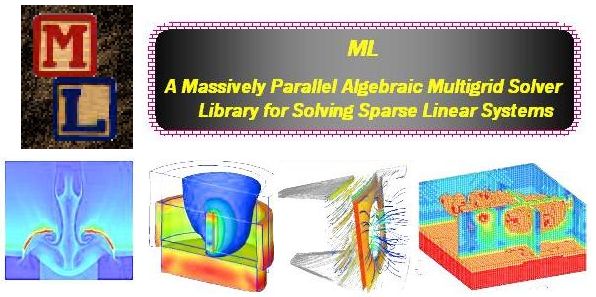|
ML
Version of the Day
|
|
ML
Version of the Day
|

ML is a large package. The following documents are suggested for ML users:
Probably, the best way to understand ML is to use it. Several examples are provided in the Trilinos/packages/ml/examples subdirectories. Users are suggested to compile and run these examples. Often, a copy-and-paste approach is good enough to start with ML. This is particularly true for the ML/Epetra interface.
Several examples are distributed within ml. You can browse the source file of the following examples:
To take advantage of the ML/Epetra interface, ML must be configured with the following options:
–enable-epetra –enable-teuchos We suggest enabling the Amesos interface (–enable-amesos). Amesos is a Trilinos package that interfaces with various serial and parallel sparse direct solvers. Morever, it contains a simple serial sparse direct solver (KLU), that is quite good for small matrices.
New users interested in the ML/Epetra interface should take a look to the following classes (both in the ML_Epetra namespace):
Detailed examples are reported in:
This documentation is targeted to the ML_Epetra::MultiLevelPreconditioner class. It is very useful to have a list of the available parameters for a given option. This can be in obtained from the comments of:
The following structure are used by ML:
ML is bases on a particular (and very flexible) matrix format, defined by the ML_Operator struct. A set of conversion utilities exists to:
All the conversion functions are declared in file ml_epetra_utils.h.
If configured with options –enable-amesos –enable-epetra –enable-teuchos, ML can take advantage of Amesos to solve the coarse problem.
Details about the ML/Amesos interface are reported in file ml_amesos_wrap.h.
If configured with options –enable-ifpack –enable-epetra –enable-teuchos, ML can use IFPACK to define ILU-type smoothers.
Details about the ML/IFPACK interface are reported in file ml_ifpack_wrap.h.
If configured with options –enable-anasazi –enable-epetra –enable-teuchos, ML can use Anasazi for eigenvalue computations.
The user can:
Details about the ML/Anasazi interface are reported in file ml_anasazi.h, and in the ML_Anasazi namespace.
An object-oriented layer based on ML, called MLAPI, can be used to access most of the ML capabilites in a very way. Click Overview of MLAPI for more details.
ML is accessible from Python through the PyTrilinos package. Using PyTrilinos, ML can be used to create black-box preconditioners based on smoothed aggregation for both serial and parallel runs, using a standard Python interpreter. Please refer to the PyTrilinos homepage for more details.
Adapters are available for using ML with the Thyra solver components. See ML/Thyra adapters.
It is possible to instruct ML_Epetra::MultiLevelPreconditioner to print out the process ID, so that one can attach to the desired process. One can proceed as follows:
ML_debug_now in the directory of the executable.(see also the documentation of method ML_Epetra::MultiLevelPreconditioner::BreakForDebugger()).
If ML is compiled with -DML_MEM_CHECK, the destruction of ML_Epetra::MultiLevelPreconditioner() will verify that memory has not been corrupted, and that no memory leak occurs. Note that this option may be computationally expensive, and it is not recommended for performance evaluations.
Consult the ChangeLog file. The README file gives some other information about ML.
Under terms of Contract DE-AC04-94AL85000, there is a non-exclusive license for use of this work by or on behalf of the U.S. Government. This library is free software; you can redistribute it and/or modify it under the terms of the GNU Lesser General Public License as published by the Free Software Foundation; either version 2.1 of the License, or (at your option) any later version. This library is distributed in the hope that it will be useful, but WITHOUT ANY WARRANTY; without even the implied warranty of MERCHANTABILITY or FITNESS FOR A PARTICULAR PURPOSE. See the GNU Lesser General Public License for more details. You should have received a copy of the GNU Lesser General Public License along with this library; if not, write to the Free Software Foundation, Inc., 51 Franklin St, Fifth Floor, Boston, MA 02110-1301 USA
 1.8.5
1.8.5